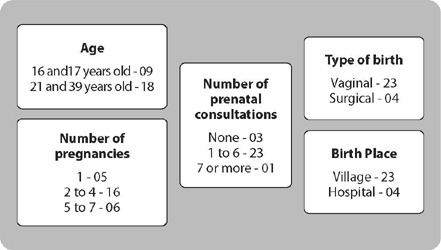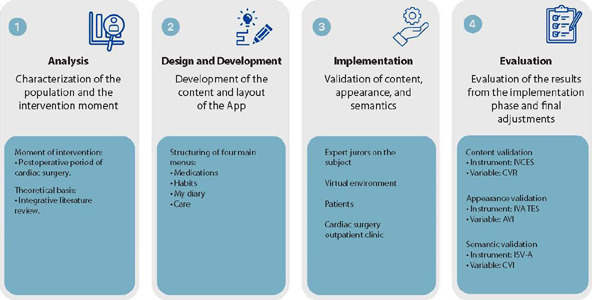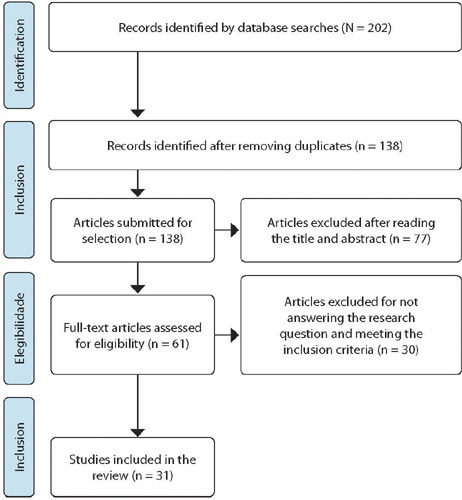-
ORIGINAL ARTICLE
Indigenous women’s experiences about the pregnancy-puerperal cycle
Revista Brasileira de Enfermagem. 2024;77:e20230410
10-11-2024
Abstract
ORIGINAL ARTICLEIndigenous women’s experiences about the pregnancy-puerperal cycle
Revista Brasileira de Enfermagem. 2024;77:e20230410
10-11-2024DOI 10.1590/0034-7167-2023-0410
Views0See moreABSTRACT
Objectives:
to understand the experiences of indigenous women regarding the pregnancy-puerperal cycle.
Methods:
qualitative, exploratory and descriptive research, carried out between May and August 2023 with 27 pregnant women from Indigenous Villages in Mato Grosso, Brazil, through open individual interviews. The data was analyzed using Reflexive thematic analysis.
Results:
data analysis resulted in the following themes: Cultivation of labor and birth in its natural and sacred path; Unique practices and beliefs associated with breastfeeding; Evolved or reductive thinking? The participants suggest inviolable practices and beliefs, which must be welcomed, respected and enhanced by indigenous health teams.
Final Considerations:
the experiences of indigenous women regarding the pregnancy-puerperal cycle are unique and motivated by inviolable cultural and religious beliefs, which transcend scientific knowledge, certainties and the linearity of contemporary approaches, normally established as order.

-
ORIGINAL ARTICLE
Indicators of emotional distress and mindfulness in undergraduate students: a cross-sectional study
Revista Brasileira de Enfermagem. 2024;77(5):e20230499
10-07-2024
Abstract
ORIGINAL ARTICLEIndicators of emotional distress and mindfulness in undergraduate students: a cross-sectional study
Revista Brasileira de Enfermagem. 2024;77(5):e20230499
10-07-2024DOI 10.1590/0034-7167-2023-0499
Views0See moreABSTRACT
Objectives:
to assess the association between indicators of emotional distress and dispositional mindfulness in health students at a Brazilian federal public university.
Methods:
a cross-sectional study, developed with university students in the health area of a public institution from May to June 2022. In the analysis, multiple linear regression was used using SPSS software.
Results:
the sample was mostly female, ≤ 22 years old, non-white, studying the first semesters, with a higher prevalence for the medicine course. Students presented moderate dispositional mindfulness scores. It was observed that the variables of stress, depression and current suicide risk were associated with the capacity for mindfulness.
Conclusions:
knowing the indicators of emotional distress that are related to the potential of mindfulness can contribute as a situational diagnosis to better design strategies that promote the improvement of emotional indicators of health students.
-
ORIGINAL ARTICLE
Development and validation of a mobile application prototype for postoperative cardiac surgery
Revista Brasileira de Enfermagem. 2024;77(5):e20230491
10-07-2024
Abstract
ORIGINAL ARTICLEDevelopment and validation of a mobile application prototype for postoperative cardiac surgery
Revista Brasileira de Enfermagem. 2024;77(5):e20230491
10-07-2024DOI 10.1590/0034-7167-2023-0491
Views0See moreABSTRACT
Objectives:
to develop and validate the content, appearance, and semantics of a prototype application for monitoring patients in the postoperative period of cardiac surgery.
Methods:
this is a technological development study based on Contextualized Instructional Design. The content and appearance evaluation was conducted by a committee of specialists, and semantic validation was carried out by patients from a cardiac surgery outpatient clinic.
Results:
the application prototype consisted of 43 screens, validated by 17 health specialists, with content validity ratio and appearance validity index results of 0.86 and 0.99, respectively. For semantic validation, 10 patients participated in data collection, with a total content validity index of 0.978.
Conclusions:
the prototype of the “VivaCor PósOp” application demonstrated evidence of content, appearance, and semantic validity, with the potential to stimulate self-care in patients in the postoperative period of cardiac surgery.

-
REVIEW
Risk factors associated with the occurrence of the adverse event phlebitis in hospitalized adult patients
Revista Brasileira de Enfermagem. 2024;77(5):e20240162
10-07-2024
Abstract
REVIEWRisk factors associated with the occurrence of the adverse event phlebitis in hospitalized adult patients
Revista Brasileira de Enfermagem. 2024;77(5):e20240162
10-07-2024DOI 10.1590/0034-7167-2024-0162
Views0See moreABSTRACT
Objectives:
to synthesize knowledge regarding risk factors associated with occurrence of adverse event phlebitis in hospitalized adult patients.
Methods:
an integrative literature review, carried out in the CINAHL, PubMed, Virtual Health Library, Embase, Web of Science and Scopus databases. The stages were carried out independently by two reviewers, and the data were analyzed descriptively.
Results:
from the analysis of 31 quantitative primary studies, the following risk factors were summarized: length of stay; use of antibiotics; peripheral intravenous catheter dwell time; receive less nursing care; catheter inserted multiple times; patients with infection and comorbidities; presence of pain at catheter insertion site; Teflon® catheter use; reduced patient mobility; quality of patient’s vein; skin elasticity; unsuccessful insertion.
Conclusions:
it is necessary to standardize the format for measuring occurrence of this adverse event and develop new studies with a higher level of evidence.

-
ORIGINAL ARTICLE
Consequences of the legislation issued for nursing education in times of COVID-19 (2020-2022)
Revista Brasileira de Enfermagem. 2024;77(5):e20230375
10-07-2024
Abstract
ORIGINAL ARTICLEConsequences of the legislation issued for nursing education in times of COVID-19 (2020-2022)
Revista Brasileira de Enfermagem. 2024;77(5):e20230375
10-07-2024DOI 10.1590/0034-7167-2023-0375
Views0See moreABSTRACT
Objectives:
to analyze the legislation issued during the COVID-19 pandemic for nursing education and immediate consequences.
Methods:
documentary research, whose source was the legislation issued for nursing education during the COVID-19 pandemic. Thirty-two documents were analyzed and submitted to a collection instrument.
Results:
contradictions and consequences for nursing education following the guidelines and law of guidelines and bases were revealed. The consequences of the law affected the quality of teaching, equal access, exemption from minimum school days and course abbreviation. Regarding the guidelines, there was a lack of conditions for developing skills, in addition to the attempt to update them. Concerning internships, acting during the pandemic put students at risk, and their abbreviation prevented them from consolidating knowledge and skills.
Final Considerations:
remote teaching did not guarantee the quality and equality of teaching, weakened the development of skills, not taking into account nursing’s educational needs.

-
ORIGINAL ARTICLE
Educational video for adherence to vaginal pessary in pelvic organ prolapse treatment
Revista Brasileira de Enfermagem. 2024;77:e20230515
09-30-2024
Abstract
ORIGINAL ARTICLEEducational video for adherence to vaginal pessary in pelvic organ prolapse treatment
Revista Brasileira de Enfermagem. 2024;77:e20230515
09-30-2024DOI 10.1590/0034-7167-2023-0515
Views0ABSTRACT
Objectives:
to construct and assess an educational video to promote the adherence of women with pelvic organ prolapse to vaginal pessary use.
Methods:
this is a methodological study, with a longitudinal design and quantitative analysis. The pre-production (synopsis, argument, script, storyboard), production and post-production stages were covered. Content and technical assessments were carried out by judges from the health and communication areas, respectively, and appearance assessment by the target audience.
Results:
the video was the first to be developed on the topic on the national scene, considered assessed from the point of view of appearance and content, presenting an overall Content Validity Index of 0.99 and a level of agreement among judges of 91.1% to 100%. Assessment by the target audience reached a percentage of 96% to 100%.
Conclusions:
the educational video is an instrument capable of promoting adherence to pessary in women indicated for this therapeutic approach.
Keywords:Health CommunicationInstructional Film and VideoPelvic Organ ProlapsePessariesTreatment Adherence and ComplianceSee more
-
EXPERIENCE REPORT
Health promotion of long-haul truck drivers and their families
Revista Brasileira de Enfermagem. 2024;77:e20230511
09-30-2024
Abstract
EXPERIENCE REPORTHealth promotion of long-haul truck drivers and their families
Revista Brasileira de Enfermagem. 2024;77:e20230511
09-30-2024DOI 10.1590/0034-7167-2023-0511
Views0ABSTRACT
Objectives:
to describe the development of a Health Information and Communication Technology for the health care of long-haul truck drivers and their families.
Methods:
this is a description of the development of an Information and Communication Technology, developed from March to September 2023, following the systematization of the experience in five steps: 1) starting point, 2) initial questions, 3) recovery of the lived process, 4) background reflection, and 5) arrival points.
Results:
the technology called “Work-Family Balance,” electronically available, presents resources for the health care of long-haul truck drivers. It is anchored in studies on the health of long-haul truck drivers, notes from the International Labor Organization, the Strategic Action Plan for Confronting Chronic Diseases and Non-Communicable Diseases in Brazil, 2021-2030, and the Declaration by the International Association of Family Nursing.
Final Considerations:
the theoretical improvement of nursing can potentially improve the health care of long-haul truck drivers, prevent Chronic Non-Communicable Diseases, and promote work-life balance to achieve the goals of Agenda 2030.
Keywords:Family HealthInformation TechnologyNoncommunicable DiseasesSustainable DevelopmentWork-Life BalanceSee more
-
ORIGINAL ARTICLE
Giving new meaning to the impact of touch in Shantala massage: mothers’ perceptions of maternal and child well-being
Revista Brasileira de Enfermagem. 2024;77:e20240012
09-30-2024
Abstract
ORIGINAL ARTICLEGiving new meaning to the impact of touch in Shantala massage: mothers’ perceptions of maternal and child well-being
Revista Brasileira de Enfermagem. 2024;77:e20240012
09-30-2024DOI 10.1590/0034-7167-2024-0012
Views0See moreABSTRACT
Objectives:
to understand maternal perceptions of maternal and child well-being based on Shantala massage and discuss its association with the third Sustainable Development Goal.
Methods:
a descriptive-exploratory study in the light of Symbolic Interactionism. Eight women, mothers of infants, participated in five online meetings to teach Shantala massage, collected in focus groups, between November and December 2021. The data was subjected to thematic content analysis and lexical analysis with IRAMUTEQ®.
Results:
two categories emerged, 1) Maternal perceptions of Shantala massage and its promotion of child well-being and 2) Maternal perceptions of Shantala massage and its impact on their well-being, interconnected with subcategories.
Final Considerations:
Shantala massage promoted mutual impacts on maternal and child well-being, working together to achieve the third Sustainable Development Goal.

-
ORIGINAL ARTICLE
Nurse care for the hospitalized elderly’s spiritual dimension
Revista Brasileira de Enfermagem. 2019;72:236-242
12-05-2019
Abstract
ORIGINAL ARTICLENurse care for the hospitalized elderly’s spiritual dimension
Revista Brasileira de Enfermagem. 2019;72:236-242
12-05-2019DOI 10.1590/0034-7167-2018-0685
Views0See moreABSTRACT
Objective:
to analyze the nurse care for the spiritual hospitalized elderly’s dimension.
Method:
a qualitative study, based on Jean Watson’s Theory of Human Caring. The study included 17 nurses working in a geriatric center in Salvador City, Bahia State, Brazil. The collection of testimonies occurred between January and April of 2018, through an interview.
Results:
spiritual care were dialogue, encouragement and respect for religious activities, embracement, empathy. One of the obstacles to providing this care was the lack of preparation in accessing the elderly’s spiritual dimension.
Final considerations:
spirituality is a dimension of human and holistic nursing care. Caring for the spirit contributes to foster transpersonal care. The difficulty may be in the lack of nurses’ preparation. It is necessary that they cultivate and live their own spirituality, transmitting the understanding in each care relationship.
-
REFLECTION
Nursing Process in the Brazilian context: reflection on its concept and legislation
Revista Brasileira de Enfermagem. 2022;75(6):e20210898
05-11-2022
Abstract
REFLECTIONNursing Process in the Brazilian context: reflection on its concept and legislation
Revista Brasileira de Enfermagem. 2022;75(6):e20210898
05-11-2022DOI 10.1590/0034-7167-2021-0898
Views0ABSTRACT
Objectives:
to reflect on the global understanding of the Nursing Process concept, with emphasis on the Brazilian context.
Methods:
a reflection article, aligned with the vision and expertise of researchers who are members of the Nursing Process Research Network.
Results:
the reflection is presented in two main topics: The evolution of Systematization of Nursing Care X Nursing Process concepts and its consonance with national and international practices, and Brazilian legislation; The Nursing Process concept realignment in Brazilian legislation in line with current care, teaching and research practices. Final Considerations: the reflections were oriented to the Nursing Process’ conceptual, normative and legal issues, including elements of its historical evolution, and, with that, pointed to the need to modify the Brazilian regulation on the Nursing Process.
Keywords:Education, NursingLegislationNursingNursing CareNursing ProcessStandardized Nursing TerminologySee more -
ORIGINAL ARTICLE
Hammock and nesting in preterm infants: randomized controlled trial
Revista Brasileira de Enfermagem. 2019;72:96-102
12-13-2019
Abstract
ORIGINAL ARTICLEHammock and nesting in preterm infants: randomized controlled trial
Revista Brasileira de Enfermagem. 2019;72:96-102
12-13-2019DOI 10.1590/0034-7167-2018-0099
Views0See moreABSTRACT
Objective:
To compare the physiological variables and the sleep-wake pattern presented by preterm in nesting and hammock positions after diaper change.
Method:
This is a crossover randomized controlled trial. It was conducted with 20 preterm infants who, after diaper change, were placed in nests or hammocks. These preterm infants were evaluated for physiological variables (heart rate and oxygen saturation) and behavioral variables (sleep and wakefulness).
Results:
There was no statistically significant difference in the studied variables between nesting and hammock positions. However, regarding the categorical variable sleep, the comparison between the research phases for the hammock position showed differences between the baseline phase and the immediate recovery (p=0.00), baseline and late recovery (p=0.00), response and immediate recovery (p=0.00), response and late recovery (p=0.00).
Conclusion:
No differences were identified between the nest and the hammock; however, the use of the hammock favored the sleep of preterm infants compared to its non-use.

-
ORIGINAL ARTICLE
Cervical cancer: knowledge, attitude and practice on the prevention examination
Revista Brasileira de Enfermagem. 2019;72:25-31
12-13-2019
Abstract
ORIGINAL ARTICLECervical cancer: knowledge, attitude and practice on the prevention examination
Revista Brasileira de Enfermagem. 2019;72:25-31
12-13-2019DOI 10.1590/0034-7167-2017-0645
Views0ABSTRACT
Objective:
to evaluate the knowledge, attitude and practice of women on the cervical-uterine cancer screening and to investigate their association with sociodemographic variables.
Method:
a cross-sectional study, carried out from July to September 2015, with 500 women enrolled in the Basic Health Units of the Health District V, of the city of Recife-PE. For data collection, a semi-structured form was used. In statistical analysis, the Chi-square test and Fisher’s Exact Test were applied and, in the multivariate analysis, the Poisson model and Wald statistic.
Results:
the prevalence of adequate knowledge, attitude and practice was 35.2%, 98% and 70.6%, respectively. Adequate knowledge was associated with having no children, having a family income of two minimum wages and Spiritist/Afro-Brazilian religion.
Conclusion:
women carry out the examination, deem it necessary, but do not have adequate knowledge, which demonstrates the need for educational actions by nurses and other health professionals.
Keywords:Knowledge, Attitudes and Practice in HealthNursingPapanicolaou TestUterine Cervical NeoplasmsWomen's HealthSee more -
REFLECTION
Pre-hospital assistance by ambulance in the context of coronavirus infections
Revista Brasileira de Enfermagem. 2021;74:e20200657
02-15-2021
Abstract
REFLECTIONPre-hospital assistance by ambulance in the context of coronavirus infections
Revista Brasileira de Enfermagem. 2021;74:e20200657
02-15-2021DOI 10.1590/0034-7167-2020-0657
Views0ABSTRACT
Objective:
To reflect on the safe care exercised by the pre-hospital care team by emergency ambulance in times of coronavirus infection.
Method:
A reflection and description of how to provide safe care to the patient and the professional during pre-hospital care in times of coronavirus infection.
Results:
To ensure the health of all those involved in the care, health professionals who work in pre-hospital care by emergency ambulance should use the recommended Personal Protective Equipment (PPE), such as the use of surgical masks and N95, N99, N100, PFF2 or PFF3, the use of an apron or overall, goggles and face shield, gloves and a hat. The entire team must receive training and demonstrate the ability to use PPE correctly and safely.
Final considerations:
The professional working in the pre-hospital care by ambulance is exposed to a series of occupational risks that need to be discussed and minimized through professional training.
Keywords:AmbulanceCoronavirus InfectionsEmergency Medical ServicesPatient SafetyPre-Hospital AssistanceSee more -
ORIGINAL ARTICLE
Patient participation in care safety: Primary Health Care professionals’ perception
Revista Brasileira de Enfermagem. 2021;74(2):e20200773
06-16-2021
Abstract
ORIGINAL ARTICLEPatient participation in care safety: Primary Health Care professionals’ perception
Revista Brasileira de Enfermagem. 2021;74(2):e20200773
06-16-2021DOI 10.1590/0034-7167-2020-0773
Views0ABSTRACT
Objectives:
to analyze health professionals’ perception about the meaning and practice of patient involvement in care safety in Primary Health Care.
Methods:
this is an exploratory, qualitative study, developed with 22 professionals in the Federal District, Brazil. A semi-structured interview was conducted between October and November/2018. Content analysis was carried out according to Bardin.
Results:
nurses, physicians, dentists, among others, participated. The following categories emerged: Meaning of patient involvement in care safety; Factors intervening in patient involvement in care safety; Strategies for patient involvement in care safety; Qualification for patient involvement in care safety.
Final Considerations:
the meaning of patient involvement for care safety was associated with co-responsibility and patient-centered care. Professionals’ practice revealed intervening factors and the use of involvement strategies. A gap was identified in training on patient involvement in care safety.
Keywords:Knowledge Management for Health ResearchPatient ParticipationPatient SafetyPrimary Health CareProfessional PracticeSee more -
Emotional labor of nurses in the front line against the COVID-19 pandemic
Revista Brasileira de Enfermagem. 2021;74:e20200660
04-14-2021
Abstract
Emotional labor of nurses in the front line against the COVID-19 pandemic
Revista Brasileira de Enfermagem. 2021;74:e20200660
04-14-2021DOI 10.1590/0034-7167-2020-0660
Views0See moreABSTRACT
Objective:
To analyze nurses’ experiences in the front line of the fight against the COVID-19 pandemic regarding the performance of emotional labor (EL), aiming at its characterization and identification of support strategies and development opportunities of nurses and practices.
Methods:
Qualitative, descriptive, and exploratory study, with content analysis of eleven written narratives and reports from a focus group composed of nurses with experience in caring for patients with COVID-19 from different Hospital Centers in Lisbon, Portugal.
Results:
Five themes were extracted: 1) Challenges experienced by nurses in the frontline; 2) Emotions experienced by nurses in service care; 3) Emotional responses of nurses and patients: impact on care; 4) EL of nurses in the patient care process; 5) Opportunities for development in the face of the emotional challenge required of nurses in combating COVID-19.
Final considerations:
The nurses demonstrated the ability to transform this profoundly emotional experience positively.

Search
Search in:
Nuvem de Tags
Aged (144) Atenção Primária à Saúde (239) COVID-19 (104) Cuidados de Enfermagem (269) Educação em Enfermagem (151) Educação em Saúde (139) Enfermagem (930) Estudos de Validação (131) Health Education (144) Idoso (208) Mental Health (149) Nursing (987) Nursing Care (306) Patient Safety (151) Primary Health Care (284) Qualidade de Vida (104) Quality of Life (106) Saúde Mental (145) Segurança do Paciente (150) Validation Studies (108)



